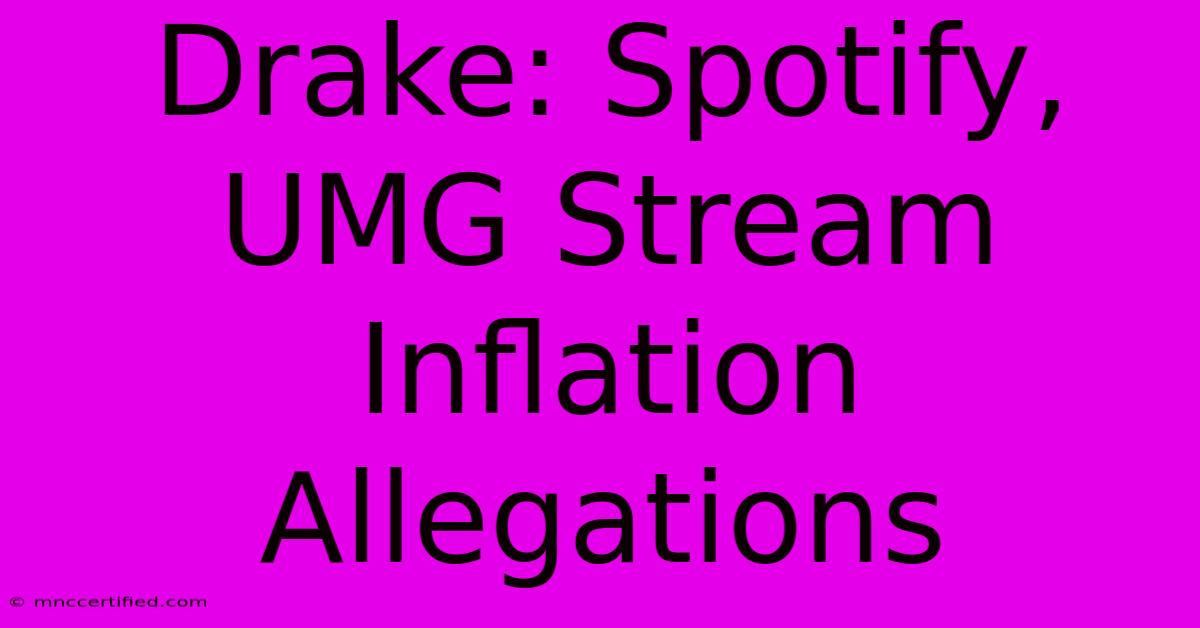Drake: Spotify, UMG Stream Inflation Allegations

Table of Contents
Drake: Spotify, UMG Stream Inflation Allegations – Unpacking the Controversy
The music industry is a complex ecosystem, and recent allegations surrounding Drake, Spotify, and Universal Music Group (UMG) have thrown a spotlight on the murky world of streaming data and potential manipulation. This article delves into the controversy, examining the claims of stream inflation, its potential impact, and the wider implications for the industry.
The Allegations: Inflated Streams and Artificial Popularity?
The core allegation revolves around the possibility of artificially inflated stream counts for Drake's music on Spotify. While no concrete evidence has been publicly presented to definitively prove widespread manipulation, the suspicion centers on the relationship between Drake, UMG (his label), and Spotify's algorithms and promotional practices. Critics suggest that UMG, as one of the largest record labels globally, might leverage its influence to boost Drake's numbers, potentially gaining an unfair competitive advantage.
What fuels the speculation?
Several factors contribute to the ongoing speculation:
- Drake's consistent dominance: Drake's almost unparalleled chart success and consistent high stream counts raise questions. While his talent is undeniable, some argue that his sustained dominance might be partially attributed to factors beyond purely organic listening.
- UMG's market power: UMG's significant market share gives it considerable leverage in negotiations with streaming platforms like Spotify. This influence could be leveraged to secure favorable promotional deals or algorithms that inadvertently or intentionally boost UMG artists' streams.
- Lack of transparency: The lack of complete transparency surrounding Spotify's algorithms and promotional strategies further fuels suspicion. The inner workings remain largely opaque, leaving room for speculation about potential manipulation.
The Impact: Fairness, Competition, and the Future of Streaming
The implications of stream inflation, if proven, are far-reaching:
- Unfair competition: If some artists benefit from manipulated streams, it creates an uneven playing field for independent artists and those signed to smaller labels who lack access to such resources and influence.
- Distorted charts: Inflated stream counts distort music charts, misleading listeners about genuine popularity and potentially hindering the success of deserving artists.
- Erosion of trust: Such allegations erode public trust in the integrity of streaming data and the fairness of the music industry as a whole.
Spotify and UMG's Response (or Lack Thereof)
Neither Spotify nor UMG has issued a comprehensive public response directly addressing these specific allegations. This silence only serves to further amplify the controversy and the existing skepticism. A transparent investigation and clear communication are crucial to restoring confidence in the system.
The Bigger Picture: The Future of Music Streaming Metrics
This controversy highlights the urgent need for greater transparency and accountability within the music streaming industry. Independent auditing of streaming data, clearer guidelines regarding promotional practices, and more robust mechanisms for identifying and addressing potential manipulation are essential steps towards ensuring a fair and equitable playing field for all artists.
Further Research and Discussion Points:
- Explore the role of playlist curation in shaping stream counts.
- Investigate the use of bots and other automated methods to inflate streams.
- Analyze the impact of these allegations on investor confidence in streaming platforms.
The Drake-Spotify-UMG controversy serves as a cautionary tale, urging a much-needed discussion about the future of music streaming metrics and the critical need for transparency and fair play within the industry. Only through open dialogue and rigorous investigation can we ensure a more equitable and trustworthy music ecosystem for artists and listeners alike.

Thank you for visiting our website wich cover about Drake: Spotify, UMG Stream Inflation Allegations. We hope the information provided has been useful to you. Feel free to contact us if you have any questions or need further assistance. See you next time and dont miss to bookmark.
Featured Posts
-
Bonding Company Clarksville Tn
Nov 26, 2024
-
Shelter Insurance New Albany Ms
Nov 26, 2024
-
Kanbrick Minimum Investment Pdf
Nov 26, 2024
-
Ravens Top Chargers Harbaughs 3 0 Record
Nov 26, 2024
-
Ramsey Case Director Changes His View
Nov 26, 2024